
Datta
1. The one who upholds the nobility of Varṇashramdharma (Four varṇas and four stages of life).
2. An ideal of Guru Principle and exponent of Yoga (According to Shanḍilyopanishad). Wellknown disciples of Deity Datta include Alark, Prahlad, Yadu, Sahasrarjun, Parshuram etc.
3. Teacher of Tantrashastra (According to Tripurasundarirahasya)
4. With behaviour like that of the evolved (like Shrikrushṇa), one freed from the bondage of religious restrictions (Markanḍeyapuraṇ).
5. One who lives as He wishes and is readily accessible (to those who remember Him).
6. Deity Datta and Deity Shiva bestow detachment (other Deities bestow everything but detachment).
7. Avadhut
8. A symbol of harmony
A. Shaiva (A sect that worships Shiva) and Vaishṇav (A sect that worships Shrivishṇu) : Both these sects feel close to Deity Datta because of His form as a Guru (Spiritual guide).
9. Protection from negative energies
10. Daily rituals
A. To reside at : Peak of Meru Mountain
B. To bathe at : Varanasi (on the banks of River Ganga)
C. For achaman (Sipping water from the cupped palm thrice, while uttering the first three of the twenty-four names of Shrivishṇu and releasing the water into a plate from the palm while uttering the fourth name) : Kurukshetra
D. To apply sandalwood paste : Prayag (Variation – to apply tilak [Saffron] to the forehead : Pandharpur)
E. For morning sandhya (Ritualistic worship of the Sun Deity to be performed daily at sunrise, noon and sunset by all those whose thread ceremony is performed. It is accompanied by chanting of the Gayatri mantra and meditation) : Kedar
F. To partake of Vibhuti (Sacred ash) : Kedar
G. To meditate : Gandharvapattan (Variation – Yoga : Girnar, Saurashtra, Gujarat)
H. For afternoon bhiksha (Alms asked for by a renunciant) : Kolhapur, Maharashtra
I. For lunch : Panchaleshwar, District Beed, Marathwada, Maharashtra in the bed of River Godavari
J. To chew tambul (Betel leaves with betelnut, lime, cardamoms etc.) : Rakshasbhuvan, District Beed, Marathwada, Maharashtra
K. To relax : Raivat Mountain
L. For evening sandhya : Ocean to the west of Bharat
M. To hear Puraṇas (The eighteen sacred Holy texts compiled by Sage Vyas) : Naranarayan Ashram (Variation – to hear discourses and kirtans [Narration of the glory of God through stories, punctuated with devotional songs] : Naimisharanya, Uttar Pradesh)
N. To sleep : Mahurgad (Variation – Sahyaparvat, Nanded, Maharashtra)
Of these, B, H and N are renowned seats of Deity Datta
Reference : Sanatan’s Holy Text ‘Datta’

 Main places of pilgrimage of Deity Datta
Main places of pilgrimage of Deity Datta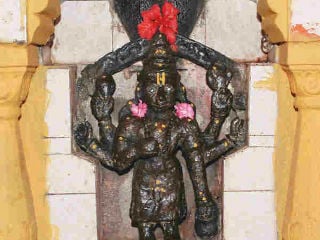 The ancient seat of Deity Datta at Shrikshetra Rakshasbhuvan : Varad Dattatreya temple
The ancient seat of Deity Datta at Shrikshetra Rakshasbhuvan : Varad Dattatreya temple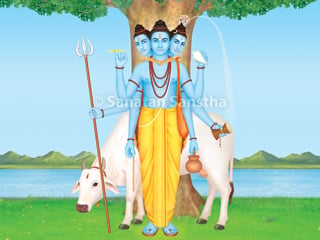 Spiritual reasons for the varying and same complexion of the trinity of Deities and also...
Spiritual reasons for the varying and same complexion of the trinity of Deities and also...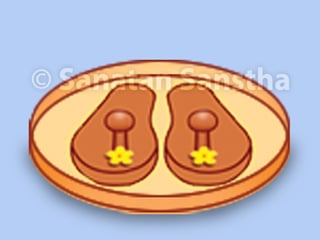 Datta Jayanti
Datta Jayanti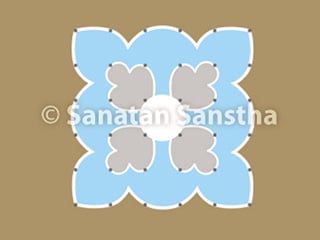 Rangolis to attract and emit Deity Datta tattva (Principle)
Rangolis to attract and emit Deity Datta tattva (Principle)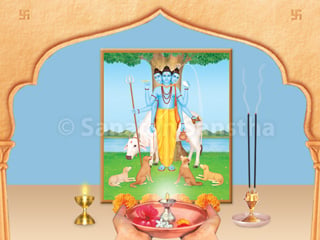 Worship of Deity Datta
Worship of Deity Datta